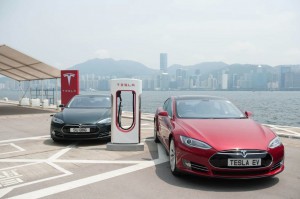Tesla Motors’ ongoing string of struggles in China have hit home as the EV is expected to cut as much as 30% of its workforce. The move is due largely to poor sales in China.
The maker will eliminate 180 of the 600 positions, according to media reports. The company is making “structural” changes to better serve current and future customers, according to the company. The cuts began at the beginning of the year.
During its most recent earnings release, the automaker said 15% of its deliveries were to Asia, but added it must increase the number of vehicles it ships to China in order to facilitate sales.
Another problem hindering sales is the perception that the Chinese have about electric vehicles, in particular, charging them. Many believe that if they do not have a garage like structure – which most do not – they cannot have a home charger, which is not true.
To help offset that, Tesla is scrambling to build hundreds of supercharger stations in urban areas to go with its nine stores and service centers in six cities. It’s partnering with China Unicom and Soho China Ltd. to build charging stations.
The Chinese market hasn’t been an easy one for the California-based EV maker. Its troubles there began before the first car hit the country’s shores as it was engaged in a trademark dispute for several years.
(Tesla takes Consumer Reports’ top spot again. For more, Click Here.)
Then it struggled to get vehicles into the country. However, it seemed its fortunes turned a bit when Elon Musk, the company’s founder and chairman, travelled to the country in the summer of 2013 to open the first store.
(Click Here for details about automaker scrambling to improve in-car cyber security.)
However, shortly thereafter, executives began leaving the company. Veronica Wu, Tesla’s former China president, and June Jin, former vice president of communications, have recently left the company.
(To see Audi powering up the R8 e-tron to compete with Tesla, Click Here.)
Initially, Musk projected sales of 500,000 vehicles in China by 2025 and construction of a plant in China to build vehicles. Tesla’s Model S sedan costs about $115,000 in China, which poses another problem.
The company’s competition, BYD and Kandi among others, are less expensive and received government subsidies as part of a program to encourage the purchase of electric vehicles in order to reduce pollution and cut gasoline consumption.


Reality seems to be catching up.